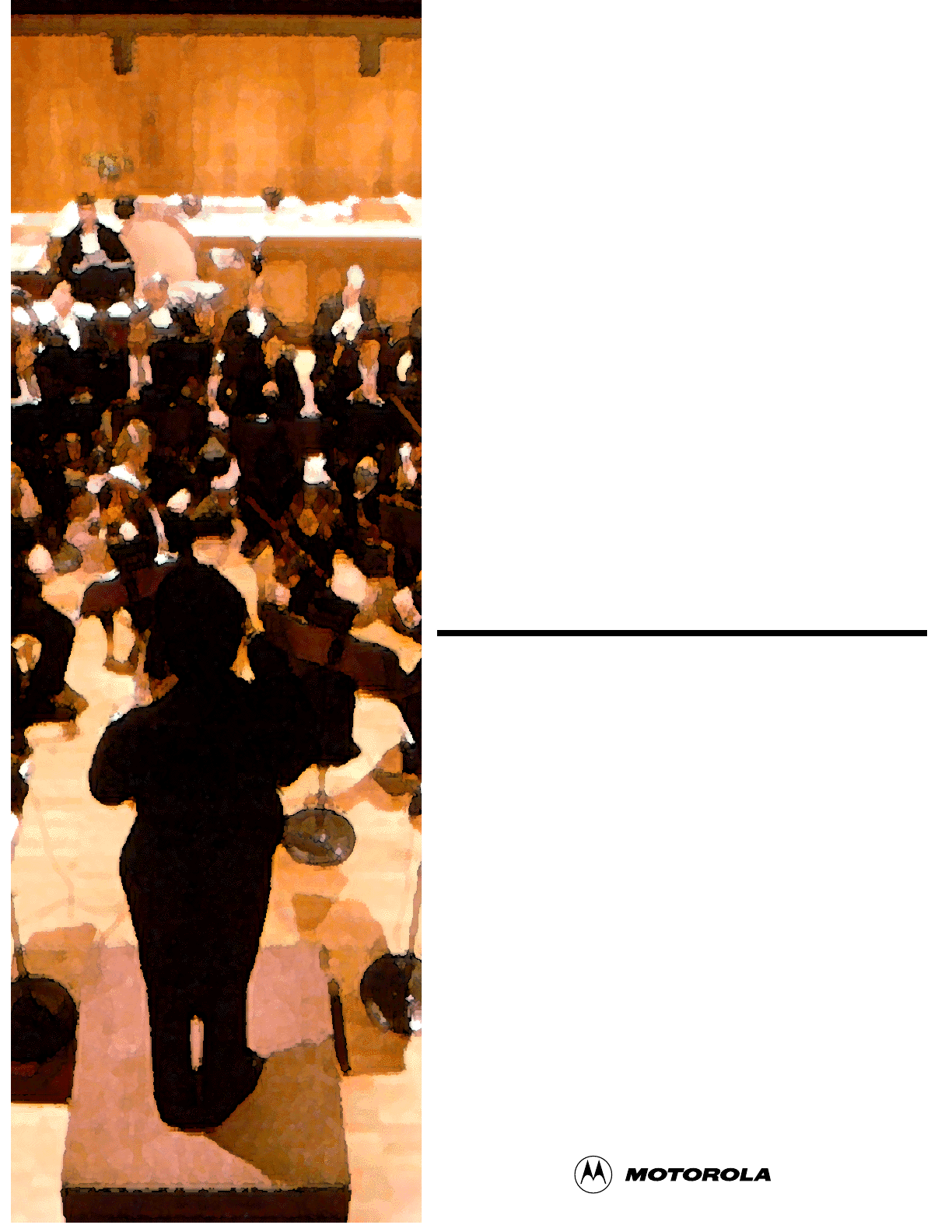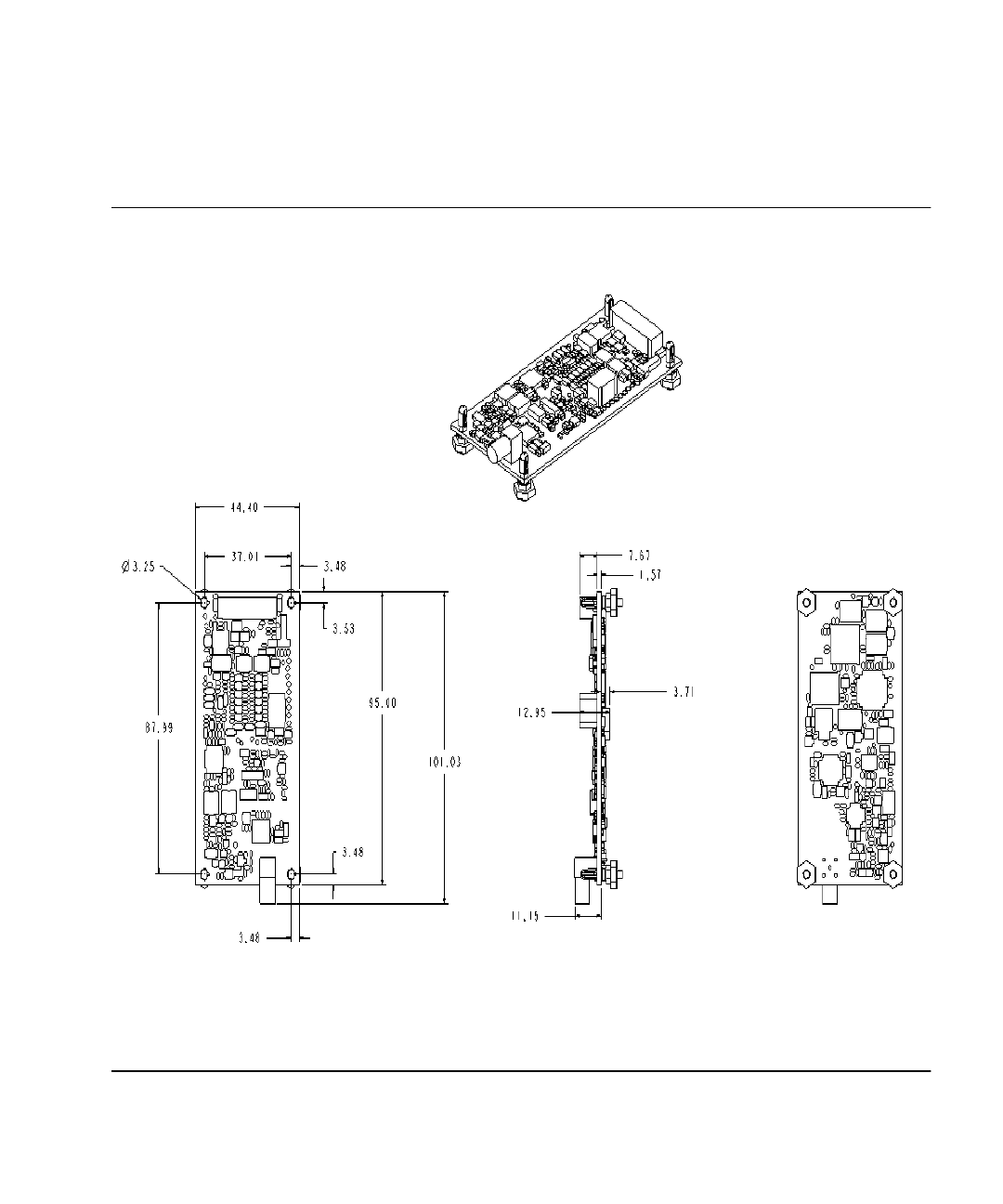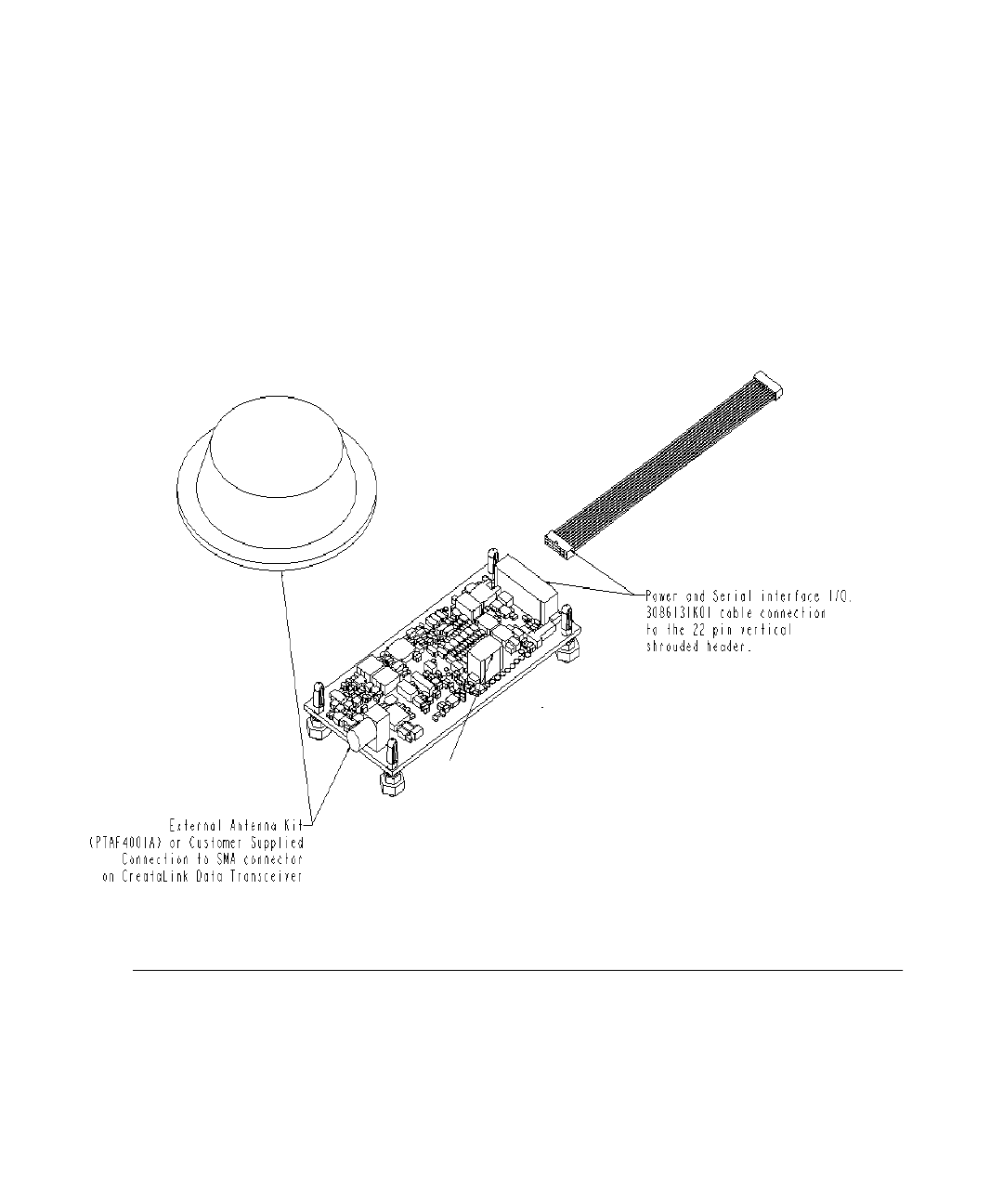Motorola Mobility 98109 User Manual
Motorola Mobility LLC Users Manual
Users Manual

CreataLink 2 XT
Installation and Operation
Issue Date: October 15, 1998
68XXXXXXXX-O
Series: Product Family 91B
Data Transceiver
TM


CreataLink 2 XT
Installation and Operation
Issue Date: October 15, 1998
68XXXXXXXX-O
Series: Product Family 91B
Data Transceiver


CreataLink 2 XT Data Transceiver Installation and Operation
October 15, 1998 68XXXXXXXX-O iii
Foreword
General Information
The information in this manual has been reviewed for accuracy. However, no responsibility is
assumed for inaccuracies. Motorola Inc. reserves the right to make changes to any products
discussed herein. The information in this document is subject to change without notice.
Motorola Inc. assumes no liability for hardware or software damage or loss of data because of
errors or omissions in this manual. Motorola Inc. does not assume any liability arising from
the application or use of any products or circuits described herein. Neither does Motorola Inc.
convey any license under its patents or right of others.
Refer questions concerning the contents of this manual to the following location:
Motorola, Inc.
Paging Products Group
3301 Quantum Boulevard,
Boynton Beach, FL 33426
or telephone: 1-800-MOT-FASD
Refer questions regarding warranty repair to Motorola Paging Products Group:
telephone: (888) 668-3273
Refer all other product inquiries to the One-Call-Support Center:
telephone: (800) 520-7243
G05_FWD.FR5 Page iii Friday, October 23, 1998 1:53 PM

Foreword CreataLink 2 XT Data Transceiver Installation and Operation
iv 68XXXXXXXX-O October 15, 1998
Computer Software Copyrights
The Motorola products described in this manual might include copyrighted Motorola
computer software stored in semiconductor memories and other media. Laws in the United
States and other countries preserve for Motorola certain exclusive rights for copyrighted
computer programs, including the exclusive right to copy or reproduce in any form the
copyrighted computer software.
Accordingly, any copyrighted Motorola computer software contained in the Motorola
products described in this manual cannot be copied or reproduced in any manner without the
express written permission of Motorola.
Furthermore, the purchase of Motorola products does not grant, either directly or by
implication, estoppel, or otherwise, any license under the copyrights, patents or patent
applications of Motorola, except for the normal, nonexclusive, royalty-free license to use that
arises by operation of law in the sale of a product.
Trademarks
CLP, CreataLink, FLEX, Motorola, the Motorola logo, and ReFLEX are trademarks or
registered trademarks of Motorola, Inc.
MAXIM is a registered trademark of MAXIM Integrated Products, Inc. Other trademarks are
noted as such throughout this document.
Trademarks contained herein are the acknowledged property of their respective owners.
G05_FWD.FR5 Page iv Friday, October 23, 1998 1:53 PM

CreataLink 2 XT Data Transceiver Installation and Operation Foreword
October 15, 1998 68XXXXXXXX-O v
Important Safety Information
The installation, maintenance, and/or operation of this equipment may present potentially
unsafe conditions, including, but not limited to, electrical shock, improper voltage to
components, and improper operation that can cause personal injury, death or damage to
property.
Read Instructions: Read all the safety instructions before operating the equipment. Retain
these safety instructions for future reference. Specialized procedures and instructions are
required and must be followed. Also, all applicable safety procedures, such as Occupational,
Safety, and Health Administration (OSHA) requirements, National Electric Code
Requirements, local code requirements, safe working practices, and good judgement must be
used by personnel.
Heed Admonitions: Adhere to all warnings on the equipment and in the operating
instructions. Follow all operating and use instructions. Two safety admonitions are used in
this instruction manual to indicate:
• Personal injury or equipment damage.
• Harmful injury that may result in death.
Mounting: Mount the equipment only as recommended by the manufacturer. Situate the
equipment away from heat sources such as radiators, heat registers, stoves, or other
equipment (including amplifiers) that produces heat.
CAUTION
This safety admonition applies to an operating or maintenance procedure, practice or
condition which, if not strictly observed, could result in personal injury or damage to
the equipment or database.
DANGER This safety admonition applies to an operating or maintenance
procedure, practice or condition which, if not strictly observed, could
result in serious personal injury or death.
G05_FWD.FR5 Page v Friday, October 23, 1998 1:53 PM

Foreword CreataLink 2 XT Data Transceiver Installation and Operation
vi 68XXXXXXXX-O October 15, 1998
Power Sources and Grounding: Connect the equipment to the type of power source
described in the installation instructions or as marked on the equipment. Take precautions to
avoid defeating the grounding or polarization provisions of the equipment. Disconnect the
power to the equipment by a circuit breaker when left unused for long periods of time.
Cleaning: Clean the outside of the equipment by using only a damp cloth. Do not immerse the
equipment in any type of liquid, including water. Do not use liquid cleaners or aerosol
cleaners. Dirt or other foreign matter should not be allowed to accumulate in the interior of
the enclosure.
Damage Requiring Service: Do not attempt to perform service functions that are not
described in the operating instructions. All other servicing should be referred to qualified
service personnel.
Motorola is not responsible for static damage to equipment not sold under the Motorola logo.
Motorola, Inc. 1997, 1998. All rights reserved. Printed in the U.S.A.
G05_FWD.FR5 Page vi Friday, October 23, 1998 1:53 PM

CreataLink™2 XT Data Transceiver Installation and Operation / Chapter 1
1-1 68XXXXXX October 15, 1998
Introduction 1
This chapter introduces the reader to this document and any other relevant documents. This
chapter covers the following topics:
Audience, 1-2
About This Manual, 1-3

Introduction CreataLink™2 XT Data Transceiver Installation and Operation
1-2 68XXXXXX October 15, 1998
Audience
This document provides technical assistance for proper installation and configuration of the
CreataLink2 XT data transceiver (referred to as CreataLink data transceiver).

CreataLink™2 XT Data Transceiver Installation and Operation Introduction
October 15, 1998 68XXXXXX 1-3
About This Manual
This document summarizes the product features and defines the installation procedures for
the CreataLink data transceiver.
The following chapters are contained within this document:
• Chapter 1: Introduction—This chapter provides a brief introduction to this document.
• Chapter 2: Product Overview—This chapter provides a general description of the
CreataLink data transceiver product.
• Chapter 3: Product Specifications—This chapter describes the product and accessories
specifications.
• Chapter 4: Installation—This chapter describes the installation procedures for the
CreataLink data transceiver.
• Chapter 5: Parts Information—This chapter provides information for ordering
accessories.

Introduction CreataLink™2 XT Data Transceiver Installation and Operation
1-4 68XXXXXX October 15, 1998

CreataLink™2 XT Data Transceiver Installation and Operation / Chapter 2
October 15, 1998 68XXXXXXX-O 2-1
Product Overview 2
This chapter describes the major parts of the CreataLink data transceiver and the interface
components.
General Description, 2-2
Interface Components, 2-3

Product Overview CreataLink™2 XT Data Transceiver Installation and Operation
2-2 68XXXXXXX-O October 15, 1998
General Description
The CreataLinkTM2 XT is a two-way data transceiver supporting the ReFLEX 25 and ReFLEX
50 protocols. Using a RS232 level serial port, the CreataLink2 XT can initiate message
transmissions into a ReFLEX NBPCS network as well as decode, store and forward messages
received from the ReFLEX network to an interconnected host device. CreataLink2 XT
performs all necessary ReFLEX protocol processing to maintain connection to the ReFLEX
network, accurately receives and acknowledges messages, and delivers messages in a manner
which complies with protocol requirements. The serial port data interface supports the
Communications Link Protocol (CLP‘).
Additionally, CreataLink2 XT supports an 8 bit bi-directional parallel I/O port with the
capability of mapping over-the-air messages directly to the port to effect changes in state on
output pins and to report changes in state to any input pins. Eight total parallel I/O signals
are present, each configurable as in input or output individually.
CreataLink2 XT also will support the ability for 3rd parties to write custom resident
applications to meet their needs; thereby, eliminating the necessity of an external interface
board in many solutions.
The CreataLink2 XT software architecture is based upon the FLEXKernel real time operating
system with the addition of ReFLEX stack software, a message manager, and the CLP default
application which provides a 3rd party embedded messaging API. Ownership of the serial
port can be passed to a 3rd party application in place of the CLP application via a Motorola
provided application framework. The selection of an ARM core based microprocessor
provides 32 bit addressing, 16 bit wide data, state of the art software development, and
debugging support tools and environment using an industry standard JTAG port.
The serial port data interface supports the Communication Linking Protocol (CLP‘). The CLP
protocol serial interface provides commands to direct the actions of the CreataLink data
transceiver to obtain status information about the network, transmit messages, and download
received messages.
The CreataLink2 XT hardware is a single PCB marrying RF, digital, and analog circuitry on a
single PCB. The product will contain no housing and will be sold as an OEM product. The
CreataLink data transceiver is available in an external antenna configuration, which provides
an industry-standard SMA connection for cabling to a remote antenna.
The CreataLink data transceiver model and configuration are shown (see Table 2-1).

CreataLink™2 XT Data Transceiver Installation and Operation Product Overview
October 15, 1998 68XXXXXXX-O 2-3
Interface Components
The CreataLink data transceiver has the following connector interfaces (see Figure 3-1):
• 22 pin polarized-shrouded-header connector used for power, ground, serial
communications, parallel I/O, 2 10-bit A/D channels, and a back up/transmit power
sourcePower/asynchronous
• 8 pin polarized-shrouded-header, JTAG connector for Software development and
download
• SMA connector. This connector is for connecting the external antenna.
Table 2-1: Model Numbers
Model Number Configuration
J12GWS0552AE ReFLEX 50 CreataLink2 XT
J11GWS0552AE ReFLEX 25 CreataLink2 XT

Product Overview CreataLink™2 XT Data Transceiver Installation and Operation
2-4 68XXXXXXX-O October 15, 1998

CreataLink™2 XT Data Transceiver Installation and Operation / Chapter 3
3-1 68XXXXXXX October 15, 1998
Product Specifications 3
This chapter describes the power requirements and specifications for the CreataLink data
transceiver and its accessories and presents typical user configurations.
Specifications, 3-2
Power Requirements, 3-3
Connectors Description, 3-4
External Antenna Connector, 3-4
Power/Asynchronous TTL Serial Port, 3-4
Accessories, 3-6
External Antenna Kit, 3-6
Power/Serial Interface Cable Assembly, 3-6
Typical Configurations, 3-8

Product Specifications CreataLink™2 XT Data Transceiver Installation and Operation
3-2 68XXXXXXX October 15, 1998
Specifications
The CreataLink data transceiver general specifications are listed in Table 3-1.
Table 3-1: General Specifications
Item Specification
Coding format ReFLEX 50
Operating temperature -40oC to +85oC
Interface
22 pin vertical shrouded header for combined power
supply and TTL serial interface; 8 pin vertical shrouded
header for JTAG interface; SMA connector for antenna
connection
Power supply requirements 5-9 Vdc, 2A maximum, 100 mV p-p up to 5 MHz ripple
Physical dimensions
Length: 3.75 in (95.25 mm)
Width: 1.75 in (44.45 mm)
Height: .7 in (17.78 mm)
Weight: 1.5 oz (42.5 grams)
Antenna External SMA connector
Transmitter specifications:
Frequency 901–902 MHz
RF power output (at antenna port) 2 W
Transmit data bit rate 9600 bps
Modulation 4-level FSK
Frequency stability 1 ppm on transmit
Receiver specifications:
Frequency 940–941 MHz
Sensitivity -120 dBm
Receive data bit rate 6400 bps
Modulation 4-level FSK
Channel spacing 50 kHz

CreataLink™2 XT Data Transceiver Installation and Operation Product Specifications
October 15, 1998 68XXXXXXX 3-3
Power Requirements
The FLEX protocol for two-way paging provides low power modes of operation for power
conservation. In receive mode, all logic and receive circuits are powered, waiting to receive a
message. In standby mode, all circuits are in a low power state for power conservation. In
transmit mode, all logic circuits and the power amplifier are active and consume larger
amounts of current for short durations. The power consumption in each mode is shown below
(see Table 3-2).
Table 3-2: Power Consumption
Operating Mode Current Drain1
1. Current drain values are approximate.
Standby 500 µA
Receive 40-50 mA
Transmit 1.4 A

Product Specifications CreataLink™2 XT Data Transceiver Installation and Operation
3-4 68XXXXXXX October 15, 1998
Connectors Description
The CreataLink data transceiver has three connectors present.
External Antenna Connector
The external antenna connector is a gold-plated SMA female connector. The connector
provides a 50-ohm contact to the CreataLink data transceiver board. Any antenna with a
standard male SMA connector can be connected to the CreataLink data transceiver.
Power/Asynchronous TTL Serial Port
The 22 pin connector provides electrical power, serial communications input, and I/O
capability for the CreataLink data transceiver (see Table 3-3, Table 3-4, and Table 3-5).
Table 3-3: 22 Pin Part Number and Specifications
Part Number Electrical Specifications
Molex P/N 87332-2220 Max rated @ 2 A
Table 3-4: 22 Vertical Header Connector Pin Signals
Pin Number Signal Name Description
1 Supply Provides Power to Device
2 GND Ground
3 TXDO 3.3V Serial Data from Creatalink
2XT
4 RS232_TXDO +/- 5V Serial Data from
Creatalink 2XT
5 BATT Backup Battery
6 BATT_GND Ground
7 RXDI TTL Serial Data Received by
Creatalink 2XT

CreataLink™2 XT Data Transceiver Installation and Operation Product Specifications
October 15, 1998 68XXXXXXX 3-5
8 RS232_RXDI RS232 Serial Data Received by
Creatalink 2XT
9 RESET_ENABLE Enables external reset capability
10 EXT_RESET External reset pin
11 RX_ACTIVE 3.3V when Creatalink 2XT is
receiving a page
12 TX_ACTIVE 0V when Creatalink 2XT is
transmitting a page
13 A/D_EXT1 Externally supplied analog input
14 A/D_EXT2 Externally supplied analog input
15 HVIO_0 Open collector output/High
voltage input
16 HVIO_1 Open collector output/High
voltage input
17 HVIO_2 Open collector output/High
voltage input
18 HVIO_3 Open collector output/High
voltage input
19 HVIO_4 Open collector output/High
voltage input
20 HVIO_5 Open collector output/High
voltage input
21 HVIO_6 Driven output/High voltage input
22 HVIO_7 Driven output/High voltage input
Table 3-4: 22 Vertical Header Connector Pin Signals
Pin Number Signal Name Description

Product Specifications CreataLink™2 XT Data Transceiver Installation and Operation
3-6 68XXXXXXX October 15, 1998
JTAG Communication Port
TABLE 3-5:
8 Vertical Header Connector Pin Signals
Pin Number Signal Name Description
1 B++ Ice power source
2 TMP1 Mode select
3 ARM_TDI JTAG Data in
4 ARM_TRST JTAG reset
5 ARM_TCK JTAG clock
6 GND3 Ground
7 ARM_TDO JTAG Data out
8 ARM_TMS JTAG I/O
TABLE 3-6: 8 Pin and 22 Pin Mating Connector Part Numbers
Part Number Electrical Specifications
Molex P/N 51110-0860 (Polarized 8 pin
receptable) Max rated @ 2 A with 26 AWG wire
Molex P/N 51110-2251 (Polarized 22
pin receptable)

CreataLink™2 XT Data Transceiver Installation and Operation Product Specifications
October 15, 1998 68XXXXXXX 3-7
Accessories
The following accessory options are available for the CreataLink data transceiver:
• External antenna kit
• Power/serial interface cable kit (for development only)
• Sahara interface pcb kit
External Antenna Kit
The optional external antenna kit includes a low profile antenna and coaxial cable with
connector (see Table 3-7).
Power/Serial Interface Cable Assembly
The power/serial interface cable interfaces the 22 pin power and serial I/O signals from the
CreataLink data transceiver to end user’s developed product for easy connection.
TABLE 3-7: External Antenna Specifications
Property Description
Type Low profile with radome
Transmit frequency 896-902 MHz (data only)
Receive frequency 929-941 MHz (data only)
Impedance 50 ohms nominal
VSWR 1.5:1 maximum
Polarization Linear, vertical
Gain 0 dBi
Maximum power 5 watts continuous
Coaxial cable 6-foot long RG58/U, with SMA male connector

CreataLink™ 2XT Data Transceiver Installation and Operation / Chapter 4
October 15, 1998 68XXXXX 4-1
Installation 4
This chapter describes the procedures required to install the CreataLink data transceiver.
Installation Overview, 4-2
Required Tools and Equipment, 4-3
Installation Procedures, 4-4
External Antenna Assembly, 4-5
CreataLink Data Transceiver Installation, 4-5
Power and Serial Port Cable Connection, 4-6
Verifying the Installation, 4-8
Troubleshooting, 4-9

Installation CreataLink™ 2XT Data Transceiver Installation and Operation
4-2 68XXXXX October 15, 1998
Installation Overview
The CreataLink data transceiver is a small, easy-to-operate product that requires a minimum
of space. Installation requires common tools and equipment. A template is provided to use in
spacing and aligning the mounting holes (see Appendix A).
The procedures provided are for basic external antenna installation.
It is important to follow the installation procedure exactly as specified and to follow the
guidelines listed below, so as to not cause the CreataLink to function improperly and/or cause
the CreataLink to become non-compliant with FCC regulations. Listed below are guidelines to
follow:
• The mounting location should be in a relatively clean EMI location, away from noisy
digital supplies and controllers. This includes mounting inside an enclosure.
• The CreataLink should not be mounted within close proximity of metallic objects, or in a
location which would subject the device to constant vibration.
• The voltage supply must be well regulated, free from excessive ripple and voltage spikes.
The ripple specification is 100mV up to 5 MHz, anything above with is considered
excessive. The voltage supply should not drop below 4.5 V when 1.5 amps are drawn
from the supply.
• The external antenna must be mounted in a location where people will never come
within 12 inches of the antenna, so as to comply with FCC RF hazard regulations.

CreataLink™ 2XT Data Transceiver Installation and Operation Installation
October 15, 1998 68XXXXX 4-3
Required Tools and Equipment
The tools and equipment required for the installation are listed in Table 4-1.
Table 4-1: Tool and Equipment List
Item Type Purpose/Use
Drill and Bit Drill with .138-inch (#28) drill
bit To drill holes in mounting surface for
data transceiver
1/2-inch drill bit To drill holes for external antenna
(PTAF1001A)
Mounting Standoffs
4 Richco Standoffs p/n
SCBSM-3-01 and nuts p/n
HN6-32-01 (or some other
standoff to mount in .128
inch pcb holes).
To connect data transceiver to
mounting surface. End user can
design a different mounting scheme
for integrating pcb assembly into the
end product.
Template Provided To mark mounting surface for data
transceiver location

Installation CreataLink™ 2XT Data Transceiver Installation and Operation
4-4 68XXXXX October 15, 1998
Installation Procedures
Follow the installation procedures in the order listed. Take into consideration CreataLink data
transceiver antenna orientation, and electrical noise factors. Check for any door opening and
closing interference before mounting the CreataLink data transceiver, if applicable.
External Antenna Assembly
For proper antenna installation, the mounting surface should be at the highest elevation, flat,
clean, and at least 8 inches in diameter. For optimum antenna performance, the mounting
surface should be metal with no metal objects within close proximity of the antenna.
1. Select a high, flat mounting surface at least 8 inches in diameter with a maximum
thickness of 0.4 inches.
Note: The mounting surface hole should be close enough to the CreataLink data transceiver location
to ensure sufficient cable length.
2. Drill a 1/2-inch hole in the center of the mounting surface.
Note: Do not cut coaxial cable. Changing the length may deteriorate antenna performance.
3. Insert coaxial cable through the mounting surface hole until the external antenna lies
flush on the mounting surface.
4. Install the lockwasher and mounting nut and tighten to a snug fit using a 3/4-inch
wrench. Do not overtighten.
CreataLink Data Transceiver Installation
1. Use the dimensions given in Figure 3-1 (37.01 mm and 87.99 mm ) to mark the mounting
location.
2. Drill four .138-inch (#28 drill bit) mounting holes.
3. Position the CreataLink data transceiver and install the Richco Standoffs (or other
equivalent standoffs to be inserted into the .128 inch pcb holes). Do not overtighten the
hex nuts.

CreataLink™ 2XT Data Transceiver Installation and Operation Installation
October 15, 1998 68XXXXX 4-5
Note: Step 4 applies only to the external antenna.
4. Connect the coaxial antenna cable to the CreataLink data transceiver SMA connector.
Tighten the cable connector finger tight only. Do not use any tools (open end wrench,
adjustable wrench, pliers, etc.) to tighten the cable connector. See Caution Statement
Above.
Power, Serial, and JTAG Port Cable Connection
This section describes the procedures for connecting cables and the power supply for both the
Motorola RS-232 power cable and a customer-supplied cable assembly.
Note: Use a common ground between the CreataLink data transceiver power ground and the host
machine.
Motorola Cable Connection
1. Connect one end of the 22 pin to 22 pin cable (p/n 3086131K01) to the 22 pin shrouded
header on the CreataLink datatransceiver and the other end of the cable to the 5-9V
power supply along with the data line interface to the end user’s product (see Table 3-4
for the CreataLink data transceiver pinout on the 22 pin shrouded header).
CAUTION
Do not overtighten the SMA mating connector. The connector should be fully seated.
Overtightening may cause permanent damage to the data transceiver.

Installation CreataLink™ 2XT Data Transceiver Installation and Operation
4-6 68XXXXX October 15, 1998

CreataLink™ 2XT Data Transceiver Installation and Operation Installation
October 15, 1998 68XXXXX 4-7
Figure 3-1

Installation CreataLink™ 2XT Data Transceiver Installation and Operation
4-8 68XXXXX October 15, 1998
Verifying the Installation
There are several ways to verify that the CreataLink data transceiver can receive and initiate
pages. Use the host system built-in test mode if available. If a built-in test mode is not
available, use a palmtop or laptop computer with a test application to prompt the CreataLink
data transceiver to initiate and read pages. Use the following methods to verify correct
installation and check the operation of the CreataLink data transceiver:
• The host system initiates a page directed to another two-way communicator to verify
network operation.
• The CreataLink data transceiver initiates multiple pages to itself to verify the capability
to send and receive pages.
• Initiate pages from the internet, E-mail, or another two-way communicator to the
CreataLink data transceiver.

CreataLink™ 2XT Data Transceiver Installation and Operation Installation
October 15, 1998 68XXXXX 4-9
Troubleshooting
Before performing detailed troubleshooting, check for faults in the external power source,
including fuses, circuit breakers, and interlocking safety switches, to eliminate these as the
potential sources of problems (see Table 4-2).
Table 4-2: Troubleshooting
Problem Fault Isolation
No power up
1. Check all interface cables for secure connections.
Repair or replace as required.
2. Check 22 pin connector pin 1 for 5 Vdc and pin 2
for ground.
No serial I/O 1. Check continuity of 22 pin connector at data
transceiver connection.
2. Check 22 pin connector pin 7 for 3.3 Vdc.
No communications
1. Check registration status using proper CLP
protocol command.1
1. Refer to the Communication Linking Protocol Serial Interface Description, part number
6880498G30, for command description.
2. If not registered, check out-of-range status using
proper CLP protocol command.1
3. For internal antenna, check antenna orientation
(see Figure 4-1).
4. For external antenna, check connection at antenna
and connection at the CreataLink data transceiver
SMA connector.

Installation CreataLink™ 2XT Data Transceiver Installation and Operation
4-10 68XXXXX October 15, 1998

CreataLink™2 XT Data Transceiver Installation and Operation / Chapter 5
October 15, 1998 688XXXXXXX-B 5-1
Parts Information 5
This chapter contains parts and ordering information for the basic and optional
configurations.
Ordering and Parts Information, 5-2

Parts Information CreataLink™2 XT Data Transceiver Installation and Operation
5-2 688XXXXXXX-B October 15, 1998
Ordering and Parts Information
Refer to the description and option number to obtain accessories information (see Table 5-1).
Order items by calling One-Call-Support at (800) 520-7243.
Table 5-1: Accessories and Options
Description Accessory Kit Number
External antenna PTAF1001A
22 Pin Ribbon Cable
Communication Linking Protocol
Serial Interface Description
CreataLink 2 XT Data Transceiver
Integrator’s Guide
